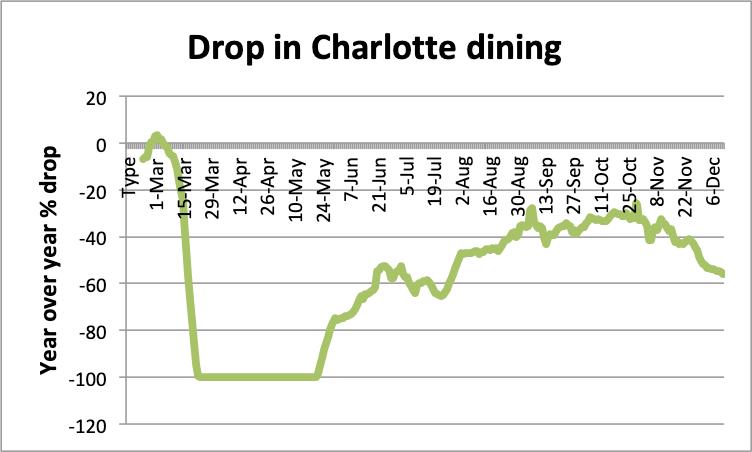A gradual ascent to airport’s top job
Plus: Charlotte diners stay home from restaurants; Health Department explains CMS advice; Novant workers could receive Covid vaccine as soon as tomorrow; Hookah bar headed to Dilworth
The Charlotte Ledger is a morning e-newsletter that delivers smart and essential business-y news to Charlotte. We have free and paid subscription plans. Sign up today:
Today’s Charlotte Ledger is sponsored by AccruePartners…
New airport director Haley Gentry takes over amid industry turbulence; App State grad called quietly forceful and a ‘doer’
Haley Gentry has spent 29 years working at Charlotte Douglas International Airport in a variety of roles. She was elevated to interim airport director in September in the middle of one of the worst crises in the history of the airline industry. (Photo from July 2018 by Rich Taylor Photography/Courtesy of Charlotte Douglas International Airport)
by Ted Reed
One night in August, Haley Gentry was unloading the dishwasher when she got a call from her boss, Brent Cagle, aviation director at Charlotte Douglas International Airport. He asked whether she would like to temporarily take over the job of running the 10th-busiest U.S. airport.
“I said ‘Wow,’ and I told Brent he had taken me by surprise,” Gentry said. “I told him I needed to discuss it with my family. And I kept unloading the dishwasher.”
On Sept. 12, Gentry stepped into the $247,939-a-year-job while Cagle assists the city manager on special projects, with an indeterminate timeframe.
Gentry, a Charlotte native, started work as an airport intern the day after she graduated from Appalachian State University in May 1991 and worked her way up. During her 29-year career, she has had only two bosses: Cagle and his predecessor, Jerry Orr, who is renowned for overseeing the airport growth that underpinned Charlotte’s emergence as a principal New South city.
It is no longer unusual for a woman to occupy the top job at a major airport. Women run the airports in Pittsburgh and Philadelphia. Between 1996 and 2004, Angela Gittens ran the Atlanta airport, then left to run Miami International Airport. In 2020, Deborah Flint left the top post at LAX to run the Toronto airport.
Still, Gentry said, “It was very uncommon when I started. I remember going to a North Carolina airports conference in Asheville, in the early to mid-1990s, with maybe 200 people there. When I went to sit down, I was one of five women in the room.
“That’s where it hit me: There weren’t many women in aviation,” she said. “Before that, I was so young and so early in my career, I didn’t have that awareness.”
Charlotte Douglas has provided a supportive environment where Gentry has been encouraged not only by two airport directors but also by Terri Pope, who became one of the airline industry’s most prominent women in 2000 after being named Charlotte station manager for US Airways, a predecessor of American Airlines. Pope and Gentry, now close friends, bonded early because they were typically the only women at Charlotte airport meetings.
“At meetings, you can always spot the doers,” Pope said. “You can tell who are the people who have the information and are feeding it to the leaders. Haley was one of those people, and Jerry Orr knew their value and gave them opportunities.
“When you first meet Haley, she’s a somewhat quiet, very kind person,” Pope said. “But you should never mistake her for being a pushover. She has this self-assuredness, and she doesn’t have the need to be flamboyant about it. She has the ability to hold back and observe and listen and take it all in, and then when she does make a comment, it’s powerful and impactful.”
At Appalachian State, Gentry started as a business major but switched to criminal justice. The combination enabled an airport intern assignment to develop a new employee security system.
“My job, which was called credentialing, was to enter all the airport employees into the badging system,” Gentry said. “I knew right away I loved the environment at the airport, so I went in and talked to Jerry Orr and I said, ‘I like it here, and I’d like to continue.’ He looked over his glasses at me and said, ‘I’ll get back to you on that.’”
Orr last week recalled Gentry as “well-qualified, strong and calm.
“I saw that she was strong-willed and didn’t back down, and I intended for her to go farther,” said Orr, who now spends much of his time on Seabrook Island near Charleston. Gentry, he said, “has spent her whole life at the airport, so now she knows where everything is.”
Gentry’s airport jobs have included media relations, airline lease negotiations, expanding air cargo opportunities and managing airport involvement in events like the 1994 NCAA Final Four and the 2012 Democratic National Convention.
Immediately before being named acting director, Gentry was the airport’s chief business and innovation officer. Besides overseeing revenue, which totaled $267M in 2019, she took charge of a new group responsible for enhancing the passenger experience through innovations such as an airport app and enabling parking arrangements from home. “We’re trying to get a lot more intuitive,” she said. “How can we connect with passengers before they arrive on our doorstep?”
Assuring airport revenue, now at 55% of the 2019 level, has been a challenge during the worst period in history for the U.S. airline industry. American’s strategy has enabled Charlotte to outperform most airports, but still “we came to a standstill and had to pivot quickly,” Gentry said. Travel plummeted but didn’t stop, raising unprecedented budgeting and staffing questions as well as safety issues.
Still, all of the airport’s 700 employees have kept their jobs. Airport bonds have maintained their AA minus rating with Fitch, but in March the agency revised the outlook to negative from stable, in line with similar airports.
A loyal Appalachian State grad, Gentry is married to another alum — husband Tom is an agronomics sales manager, and daughter Grace is a senior. The family has eight season tickets to football games. “We travel with the team quite a bit,” Gentry said, but they unfortunately missed the 2007 game when the unranked Mountaineers traveled to Ann Arbor and upset No. 5 Michigan.
Ted Reed is a former Miami Herald and Charlotte Observer reporter. His latest book is Kenny Riley and Black Union Labor Power in the Port of Charleston.
Today’s supporting sponsor is T.R. Lawing Realty:
Want to have your company’s LOGO HERE, or at the top of the newsletter, and reach thousands of Charlotte’s most influential and best informed residents? Consider a sponsorship. Email us for details.
Fewer diners in Charlotte restaurants
The number of people in Charlotte heading out to sit-down dinners is on the decline again, according to new data.
Numbers from restaurant seating software provider OpenTable confirm what you’re probably seeing anecdotally — that people are less likely to go out to eat now than a month ago as Covid numbers have risen and the weather has turned colder, limiting the appeal of outdoor seating.
Between the end of August and mid-November, the number of sit-down diners in Charlotte was down in the 30%-to-40% range, compared with a year earlier. But starting about a week before Thanksgiving, the drop increased above 40%. As of Saturday, the 7-day average of the decline was 56% — the highest since July 29, according to a Ledger analysis of the numbers.
Compared with a year earlier, the 7-day average of the number of seated Charlotte diners has fallen to its lowest level since July, according to a Ledger analysis of OpenTable data. (Source: OpenTable’s The State of the Restaurant Industry)
The timing is unfortunate for restaurants, one of the industries suffering most from the fallout of Covid. December is usually a busy time of year. January tends to be leaner.
Not to be too cynical, but if you start to see restaurants closing temporarily and citing health concerns, another important reason might also be because they have a lot fewer customers. —TM
Health Department explains non-stance on school shutdown
Charlotte-Mecklenburg Schools return to all-virtual instruction today for at least the next month — the result of the decision last week by the CMS board to keep students out of school buildings in the name of public health.
One of the more curious parts of that meeting was the refusal by the Mecklenburg County Health Department to say whether it’s better for public health for schools to be open or closed. National health experts have said in recent weeks in fairly unambiguous terms that research shows schools can open safely, children benefit from in-person instruction and that kids might actually be at less risk of catching Covid at school than in the community at large. But the school board went the other direction, after hearing from teachers worried about getting sick and dying and of children spreading the disease to ailing relatives.
At the meeting, asked to assess some of the health risks, the Health Department’s medical director, Dr. Meg Sullivan, demurred and said: “My role here is to talk through community metrics.”
Why the reluctance to weigh in? We put that question to health director Gibbie Harris at a news conference on Friday. Here’s our question and her answer, unfiltered:
Q. Since March, the Health Department has taken a very active role in being an advocate for public health. My understanding is Ms. Harris basically wrote the original stay-at-home order in March. Y’all have signed orders that resulted in the alcohol licenses being taken away from clubs like Club Onyx and El Centenario. You’ve been working closely with private schools to recommend whether they should open or close based on transmission they are seeing in their schools. This week, the CMS board, some of their members said they really haven’t gotten clear guidance from medical professionals about whether public schools should be open or closed. Given all that, why doesn’t the Health Department clearly say whether it’s in the interest of public health for public schools to be open or closed?
In many of these cases that you’re talking about, we provide guidance. We don’t always provide specific recommendations. We worked with the school system to develop the metric system that they are using right now. We have also looked carefully across the country and looked to some of our federal experts for information and guidance around what is best for schools.
What I can tell you is we know what the situation is in the community regarding Covid and the potential impact and the potential exposure that people have by coming into schools.
We are not experts on education, and in terms of what is best for the children in terms of education, that has to be part of the decision-making process. We work together with the schools rather than making specific recommendations, or telling them what they need to do around whether schools are open or not.
Mecklenburg K-12 students are scheduled to return to the classroom on Jan. 19. Some older students have mandatory statewide in-person tests this week.
Another local school board, in Cabarrus County, voted last week to return students to full-remote learning after seeing a spike in Covid cases.
Other Covid-related highlights
At that Friday news conference, officials made a number of other points:
At the hospitals: With Covid numbers rising, doctors from Atrium Health and Novant Health said they’re confident in the hospitals’ ability to manage through increases in hospitalizations, especially in the next few weeks. They said they are not close to eliminating non-essential surgeries, as they did in the spring, but that they’re closely watching staffing and the number of available beds. The hospitals need the community’s help in slowing the spread of Covid to avoid being in a “difficult position,” said Dr. Sid Fletcher, Novant’s chief clinical officer.
Vaccine update: Atrium and Novant said they expect to receive delivery of the Pfizer Covid vaccine early this week. Novant said it could start administering the 2,925 doses Presbyterian Hospital is expected to receive to healthcare workers as early as Tuesday. Healthcare workers and at-risk residents and staff at long-term care facilities will be among the first to receive the vaccine.
Curfew enforcement: Charlotte-Mecklenburg Police Capt. Jeff Estes said CMPD plans no roadblocks, checkpoints or “randomized stops of people” to enforce the 10 p.m. “curfew” that took effect Friday. But if officers encounter people out after 10 p.m., they might ask questions about curfew compliance. The order establishing the curfew contains a lot of exceptions, such as shopping for food or gas, heading to or returning from work and traveling to or from another state.
In brief:
N.C. gambling updates: The Catawba Indian Nation plans to open the first phase of its 60,000 s.f. casino in Kings Mountain by fall 2021, and it will include at least 1,300 slot machines and a restaurant, the Observer reports. Meanwhile, the Eastern Band of Cherokee Indians reached a deal with state officials that could allow the opening of sports betting at Harrah’s Cherokee Casino before the start of the 2021 NCAA men’s basketball tournament, Charlotte Agenda reports, citing an article in the tribe’s newspaper, Cherokee One Feather.
Another Beacon sale: A company connected to Beacon Partners has sold a 6.8-acre parcel on Monroe Road for $6.65M. Beacon seems to be on a selling spree lately, offloading ownership of the Metrolina Business Park and selling 7.6 acres on Morehead Street that could become Atrium Health’s new medical school.
Council to hear transit recommendation: The City Council is scheduled to receive the recommendations from a transit task force tonight that call for pursuing a sales tax increase to pay for light rail, greenways and other transportation improvements. An item on the council’s agenda includes a letter of support for the plan from the Charlotte Regional Business Alliance.
More uptown bike lanes: The city plans to award a $4.1M contract to extend the dedicated bike lanes that are now along 6th Street uptown. When finished, the bike lanes will extend from Kings Drive in Midtown to just beyond Gateway Village on 5th Street. The “uptown cycle track project” will “connect more than 40 miles of bikeways providing more transportation choices for Charlotte residents and commuters,” the city says.
Historic affordable housing: Two small “shotgun-style houses” designated as historically significant will be renovated and moved behind new construction in Charlotte’s Lakeview community in west Charlotte. The houses, likely built in the 1890s, will likely be rented to people making less than 60% of the area’s median income. (QCityMetro)
Housing diversity: City planning director Taiwo Jaiyeoba says residents like the city’s plan to eliminate single-family zoning and encourage more housing diversity, though the city needs to do more educating on what that means. He told Charlotte Agenda: “People say, ‘Oh, my gosh, you’re going to get rid of single-family residential development?’ No, that’s that’s not what we’re saying. Single-family residential units will continue to be there. We’re going to encourage or at least set policies that will allow us to be able to also have townhouses, duplexes, and even triplexes.” (Agenda)
Massive outage at Google: Gmail and YouTube went offline for users around the world for about an hour on Monday morning. (It wasn’t just you.) Service was restored around 7:30 a.m. In the meantime, people created memes. (Newsweek)
Hookah in Dilworth: Plans to open a hookah bar in Dilworth are raising some eyebrows. Signs went up recently for “Red@28th” in the old 131 Main Restaurant space across from the Starbucks at East Boulevard and Scott Avenue. The company’s website describes Red@28th as “Charlotte’s first multicultural literary lounge offering hookahs, books, full bar, outdoor patio, baked goods, coffee, and free Wi-Fi.” (A hookah is a water pipe used to smoke flavored tobacco.)
Loves me some internet


Ledger corner
A few announcements from command central:
Ledger holiday party. Our community of paying subscribers is invited to our first-ever reader holiday party. Drop in online on Thursday, Dec. 17, from 5-7 p.m. All the details are here, including the scoop on a beer 🍺 and wine 🍷 discount we’ve arranged with Divine Barrel Brewing — which delivers throughout Mecklenburg County. We’re using a tech platform that’s better for multiple small-group conversations than Zoom is.
Gift subscriptions. Why not drop some local-news knowledge on a friend or loved-one this holiday? What says “I love you” more than a $99 yearly subscription? Also available at the “I like you” $9 level for one month. You can schedule delivery for a future date and time.
Ledger gear. It’s too late to guarantee Christmas delivery, but it’s never too late to mark yourself as “essential” with a Ledger hoodie or crewneck sweatshirt — or a T-shirt.
Charitable giving. If you’re thinking about making an end-of-the-year gift, check out our list of local charities recommended by The Ledger’s community of paying subscribers.
Taking stock
Unless you are a day trader, checking your stocks daily is unhealthy. So how about weekly? How local stocks of note fared last week (through Friday’s close), and year to date:
Need to sign up for this e-newsletter? We offer free and paid subscription plans:
The Charlotte Ledger is an e-newsletter and website publishing timely, informative, and interesting local business-y news and analysis Mondays, Wednesdays, Fridays and Saturdays, except holidays and as noted. We strive for fairness and accuracy and will correct all known errors. The content reflects the independent editorial judgment of The Charlotte Ledger. Any advertising, paid marketing, or sponsored content will be clearly labeled.
Got a news tip? Think we missed something? Drop us a line at editor@cltledger.com and let us know.
Like what we are doing? Feel free to forward this along and to tell a friend.
On Facebook, LinkedIn, Instagram, Twitter.
Need an “Essential Charlotte Ledger” T-shirt? Order here.
Sponsorship information: email editor@cltledger.com.
Executive editor: Tony Mecia; Managing editor: Cristina Bolling; Contributing editor: Tim Whitmire, CXN Advisory; Reporting intern: David Griffith







